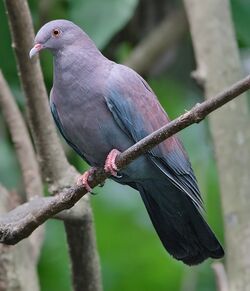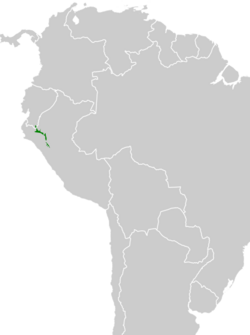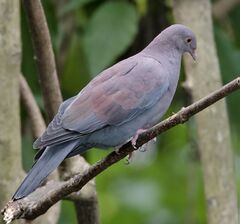Biology:Maranon pigeon
| Maranon pigeon | |
|---|---|

| |
| Scientific classification | |
| Domain: | Eukaryota |
| Kingdom: | Animalia |
| Phylum: | Chordata |
| Class: | Aves |
| Order: | Columbiformes |
| Family: | Columbidae |
| Genus: | Patagioenas |
| Species: | P. oenops
|
| Binomial name | |
| Patagioenas oenops (Salvin, 1895)
| |

| |
| Synonyms | |
|
Columba oenops Salvin, 1895 | |
The Maranon pigeon, Peruvian pigeon or Salvin's pigeon (Patagioenas oenops) is a species of bird in the family Columbidae. It is found in Ecuador and Peru.[1]
Taxonomy and systematics
The International Ornithological Committee (IOC) calls this species Maranon pigeon. The South American Classification Committee of the American Ornithological Society (AOS), the Clements taxonomy, and Handbook of the Birds of the World all call it Peruvian pigeon.[1][2][3][4]
The Maranon pigeon is monotypic. It is closely related to the red-billed pigeon (P. flavirostrus) and the plain pigeon (P. inornata); the three may form a superspecies.[1][2][5]
Description
The male Maranon pigeon is 34 cm (13 in) long and females 31 to 34 cm (12 to 13 in). They weigh about 276 g (9.7 oz). Adult males' head, neck, and breast are dull reddish or reddish purple. The upperparts are blue-gray to dark gray with a purplish chestnut cast on the mid-back and wings. The underparts are light gray and the tail dark gray. The eye is black with orange and blue rings surrounded by bare blue-gray skin. Adult females are duller and browner as are juveniles.[5]
Distribution and habitat
The Maranon pigeon is found from extreme southeastern Ecuador southeast into Peru as far as the Department of La Libertad. It seasonally moves between riparian forest and dryer upslope forest. In elevation it ranges from 850 to 2,400 m (2,790 to 7,870 ft).[5]
Behavior
Feeding
The Maranon pigeon forages in small groups. Its diet is not well known, but it has been observed eating ripe coca seeds and fruits of Cordia lutea.[5]
Breeding
Essentially nothing is known about the Maranon pigeon's breeding phenology.[5]
Vocalization
The Maranon pigeon's song is "a rhythmic series of coos, typically starting with a single note followed by triple notes repeated: 'rwhoOoh...pUh-hu-whoOOo...pUh-hu-whoOOo...pUh-hu-whoOOo...'."[5]
Status
The IUCN has assessed the Maranon pigeon as near threatened. "Habitat loss and degradation are presumably causing declines in both range and its small population."[6]
References
- ↑ 1.0 1.1 1.2 Gill, F.; Donsker, D.; Rasmussen, P. (July 2021). "IOC World Bird List (v 11.2)". https://www.worldbirdnames.org/.
- ↑ 2.0 2.1 Remsen, J. V., Jr., J. I. Areta, E. Bonaccorso, S. Claramunt, A. Jaramillo, D. F. Lane, J. F. Pacheco, M. B. Robbins, F. G. Stiles, and K. J. Zimmer. Version 24 August 2021. A classification of the bird species of South America. American Ornithological Society. https://www.museum.lsu.edu/~Remsen/SACCBaseline.htm retrieved August 24, 2021
- ↑ Clements, J. F., T. S. Schulenberg, M. J. Iliff, S. M. Billerman, T. A. Fredericks, J. A. Gerbracht, D. Lepage, B. L. Sullivan, and C. L. Wood. 2021. The eBird/Clements checklist of Birds of the World: v2021. Downloaded from https://www.birds.cornell.edu/clementschecklist/download/ Retrieved August 25, 2021
- ↑ HBW and BirdLife International (2020) Handbook of the Birds of the World and BirdLife International digital checklist of the birds of the world Version 5. Available at: http://datazone.birdlife.org/userfiles/file/Species/Taxonomy/HBW-BirdLife_Checklist_v5_Dec20.zip [.xls zipped 1 MB] retrieved May 27, 2021
- ↑ 5.0 5.1 5.2 5.3 5.4 5.5 Baptista, L. F., P. W. Trail, H. M. Horblit, P. F. D. Boesman, and E. F. J. Garcia (2020). Peruvian Pigeon (Patagioenas oenops), version 1.0. In Birds of the World (J. del Hoyo, A. Elliott, J. Sargatal, D. A. Christie, and E. de Juana, Editors). Cornell Lab of Ornithology, Ithaca, NY, USA. https://doi.org/10.2173/bow.perpig2.01 retrieved September 14, 2021
- ↑ Cite error: Invalid
<ref>tag; no text was provided for refs namedIUCN
External links
Wikidata ☰ Q1262546 entry
 |



